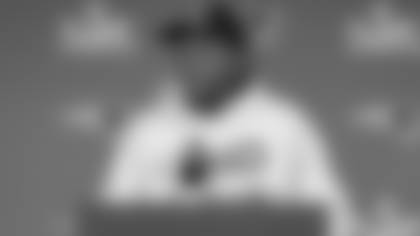ALBANY, N.Y. (Aug. 2, 2006) -- The effects of his first concussion left Jeremy Shockey nauseous, sensitive to light, reduced his motor skills and made it difficult for him to sleep, the three-time Pro Bowl tight end said.
"Don't get too close, I might get sick," a soft-spoken and rather subdued Shockey said. "I am feeling better but I have headaches and I am pretty sensitive to light."
The comments at lunch were Shockey's first to the media since he sustained what the New York Giants described as a mild concussion in a collision with safety Will Demps late in a training camp workout on July 31 night at the University at Albany.
Wearing sunglasses to protect his eyes, Shockey absolved Demps of blame for the collision, which came as both players made a play on a pass thrown by Eli Manning. The tight end said at Demps could have really laid him out if he wanted, and that he might have been better off had the safety hit him instead of knocking him off balance.
Replays showed Demps' elbow accidentally hit Shockey's facemask as the two went for the ball, knocking the tight end off his feet.
"I have never had a concussion," said the 25-year-old Shockey, noting that he has taken some big hits to his head before. "It's just a strange thing."
About a minute after the hit, Shockey got up and pointed his finger at Demps.
"I was upset at Will at first," said Shockey, who took part in the final two plays of the practice. "I thought he was going for the ball and I looked to the play, and it was the ground, Mother Nature, that caused it."
Shockey said he never lost consciousness and that he remembered everything that happened. He walked to the locker room about 150 yards away but he had trouble walking down a staircase to it.
The five-year veteran said he has been to the hospital several times for tests over the last 36 hours. Nothing bad has shown up, and he said doctors said he had a stage 1 concussion.
However, the post-concussion side effects have forced him to miss practice, which has made him feel guilty. Even sleeping is hard because he feels nauseous when he lays on his bed.
Shockey said that Aug. 1 was one of the most painful days he has experienced. He said he vomited the morning of Aug. 2.
"It was pretty scary," said Shockey, adding he would hate experiencing a really bad concussion. "I could not control my tear glands or any of my motions. I'd get real antsy. But the good thing is I did not lose any memory. My memory is all there. It happens. It's football."
Dr. Roger Hartl, an assistant professor of neurological surgery at New York Presbyterian Hospital-Weil Medical College in New York, said concussions mean different things to different people. He said it would be impossible to discuss Shockey's injury without seeing the test results.
"If he is still experiencing symptoms two days after, that might be a more severe concussion," Hartl said.
Shockey plans to return to practice when his headaches subside and he has 100 percent of his motor skills.
"I can feel the difference from yesterday to today," Shockey said. "I know for a fact I won't be out that long."




























